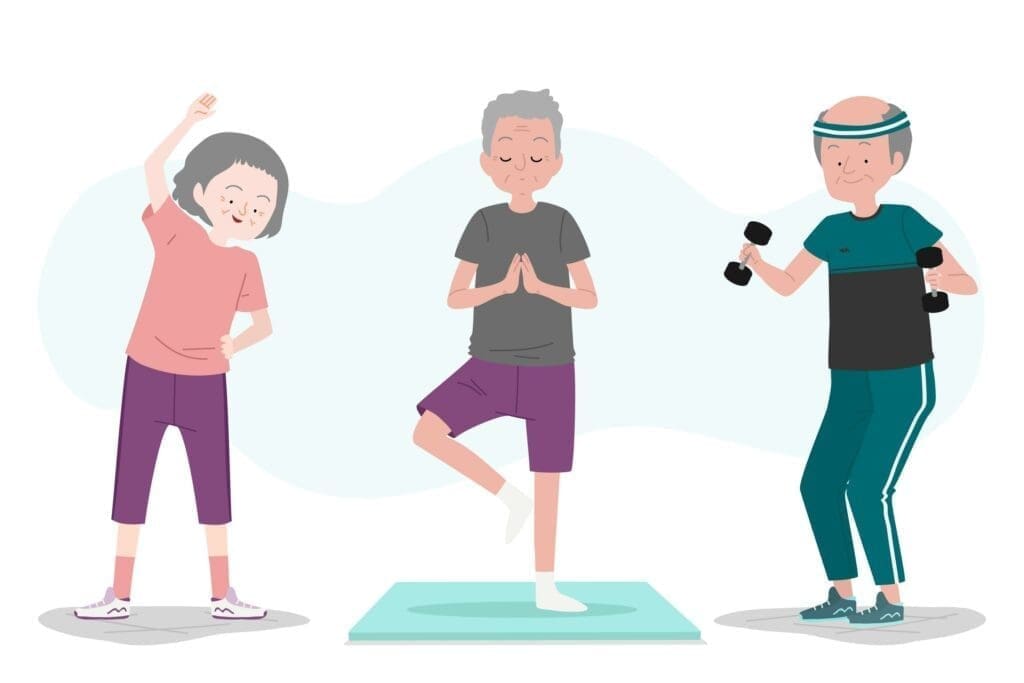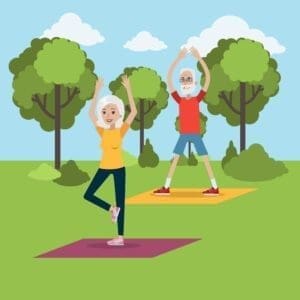Regular exercise offers numerous benefits for seniors, positively impacting both their mind and body. Engaging in physical activity has been proven to help older adults maintain mental sharpness while promoting overall physical well-being. By incorporating exercise into their daily routines, seniors can experience improved cognitive function, enhanced cardiovascular health, increased strength and flexibility, and a boosted mood. The multifaceted advantages of exercise make it an essential component of maintaining a vibrant and healthy lifestyle in later years.
Physical Benefits of Exercise for Seniors:
One of the most obvious benefits of exercise for seniors is improved physical health. Regular exercise can help improve muscle strength, balance, and flexibility, which can help prevent falls and other injuries. This is especially important for seniors, as falls can have serious consequences, such as broken bones or head injuries.
Strength training is particularly important for seniors, as it can help prevent muscle loss and maintain bone density. This can help reduce the risk of osteoporosis, a condition in which the bones become weak and brittle. By lifting weights or using resistance bands, seniors can increase their muscle mass and improve their overall strength.
In addition to strength training, cardio exercises such as walking, biking, or swimming can help improve cardiovascular health. This can reduce the risk of heart disease, stroke, and other chronic conditions. Seniors who exercise regularly may also experience improved sleep, reduced inflammation, and better digestion.
Mental Benefits of Exercise for Seniors:
Exercise is not just good for the body – it’s also good for the mind. Research has shown that regular exercise can help improve cognitive function and reduce the risk of dementia. Exercise can also help reduce stress and anxiety, improve mood, and boost overall mental health.
One way that exercise can improve cognitive function is by increasing blood flow to the brain. This can help improve memory, attention, and other cognitive abilities. Regular exercise has also been shown to increase the production of brain-derived neurotrophic factor (BDNF), a protein that is essential for the growth and maintenance of brain cells.
Exercise can also help reduce the risk of depression and anxiety in seniors. By releasing endorphins and other feel-good chemicals in the brain, exercise can help improve mood and reduce stress. Additionally, exercise can provide a sense of accomplishment and purpose, which can help boost self-esteem and overall well-being.
Exercise Recommendations for Seniors:
So, what types of exercises are best for seniors? The answer depends on a variety of factors, including overall health, fitness level, and personal preferences. However, there are some general guidelines that can help seniors get started on a fitness journey.
The American Heart Association recommends that seniors engage in at least 150 minutes of moderate-intensity aerobic activity per week, or 75 minutes of vigorous-intensity aerobic activity per week. This can include activities such as brisk walking, biking, or swimming. Additionally, seniors should engage in muscle-strengthening activities at least two days per week.
When starting an exercise program, it’s important to start slowly and gradually increase intensity. Seniors should also be sure to warm up before exercising and cool down afterward, to prevent injury. Additionally, seniors should listen to their bodies and avoid overexertion.
Tips for Seniors to Stay Motivated to Exercise:
Starting a new exercise routine can be challenging, but there are some tips that can help seniors stay motivated and on track. One of the most important things is to find an activity that is enjoyable and fits into their lifestyle. Whether it’s taking a dance class, joining a walking group, or practicing yoga, seniors should choose an activity that they look forward to.
Another way to stay motivated is to set realistic goals and track progress. Seniors can set goals such as walking a certain distance, lifting a certain weight, or completing a certain number of repetitions. By tracking progress, seniors can see how far they’ve come and stay motivated to continue.
It’s also important to find a workout buddy or accountability partner. This can be a friend, family member, or even a personal trainer. Having someone to exercise with can make the experience more enjoyable and provide added motivation.
Common Barriers to Exercise for Seniors and How to Overcome Them:
There are many barriers that can prevent seniors from exercising regularly. Some of the most common barriers include lack of time, lack of motivation, and physical limitations. However, there are ways to overcome these barriers and make exercise a regular part of daily life.
One way to overcome the barrier of lack of time is to break up exercise into smaller increments throughout the day. Seniors can take a 10-minute walk after each meal, or do a few sets of strength exercises during commercial breaks while watching TV.
Lack of motivation can be overcome by finding an activity that is enjoyable and setting realistic goals. Additionally, seniors can find an accountability partner or join a group fitness class to stay motivated.
Physical limitations can be challenging, but there are many exercises that can be modified to accommodate individual needs. Seniors with mobility issues can try exercises such as chair yoga or resistance band workouts. Seniors with joint pain can try low-impact exercises such as swimming or biking.
Exercise Classes and Programs Designed Specifically for Seniors:
Many gyms and community centers offer exercise classes and programs that are designed specifically for seniors. These classes often focus on low-impact exercises that are easy on the joints, such as yoga, Pilates, or water aerobics. Additionally, many senior centers offer group fitness classes that are tailored to specific needs, such as balance or strength training.
Another option for seniors is to work with a personal trainer who specializes in senior fitness. A personal trainer can create a customized workout program that takes into account individual needs and limitations.
The Importance of Consulting with a Healthcare Provider Before Beginning an Exercise Program:
Before starting any new exercise program, it’s important for seniors to consult with their healthcare provider. This is especially important for seniors with chronic health conditions or mobility issues. A healthcare provider can help determine what types of exercises are safe and appropriate, and can provide guidance on how to modify exercises to accommodate individual needs.
Additionally, seniors should be sure to get clearance from their healthcare provider before engaging in vigorous-intensity exercise. This can help prevent injury and ensure that seniors are engaging in exercise that is appropriate for their individual needs and health status.
Success Stories of Seniors Who Have Incorporated Exercise into Their Daily Routine
There are countless success stories of seniors who have incorporated exercise into their daily routine and have seen improvements in their physical and mental health. One such success story is that of 73-year-old Linda, who started doing yoga three times a week to help improve her balance and flexibility. After several months of consistent practice, Linda noticed significant improvements in her overall health and well-being, including better sleep and reduced joint pain.
Another success story is that of 68-year-old John, who started lifting weights twice a week to help prevent muscle loss and maintain bone density. After several months of strength training, John noticed significant improvements in his overall strength and energy levels, as well as reduced joint pain.
Conclusion: Emphasizing the Importance of Exercise for Seniors’ Overall Health and Well-being:
In conclusion, exercise is incredibly important for seniors’ overall health and well-being. Regular exercise can help improve physical health, cognitive function, and mental health, while also reducing the risk of chronic diseases such as heart disease and diabetes. By incorporating exercise into their daily routine, seniors can improve their quality of life and maintain their independence as they age. Whether it’s going for a walk, taking a yoga class, or lifting weights, there are countless ways for seniors to stay active and healthy.
Disclaimer
The content is purely informative and educational in nature and should not be construed as medical advice. Please use the content only in consultation with an appropriate certified medical or healthcare professional

